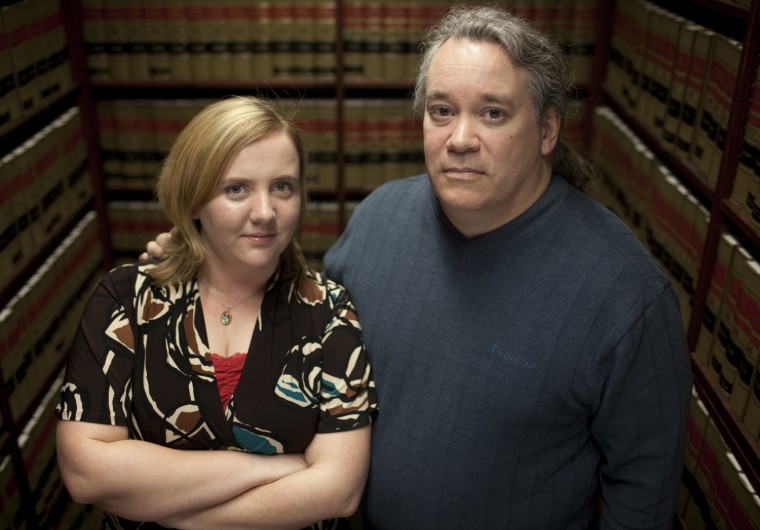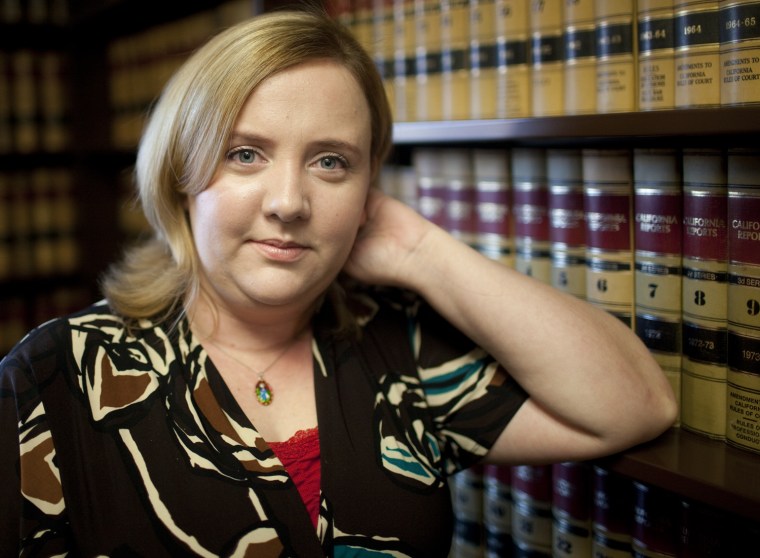
ROSEVILLE, Calif. — Here’s one thing that’s obvious about Vanessa and Chris Christman: They love their jobs as public law librarians for the state of California.
Here’s another: They don’t love the more than $150,000 in combined student loan debt they are carrying and struggling to pay off even though their joint income exceeds $100,000 a year.
“We are swimming in it,” Vanessa Christman said.
The Christmans are among the many Americans who have sought out careers that often require a lot of education but don’t guarantee huge pay in return.
The weak economy and sluggish job market have made it even more difficult for some people to find good jobs in fields such as library sciences, social work and education. Meanwhile, many are facing the prospect of having to pay down tens of thousands of dollars in debt they took on to finance their advanced training.
“It’s the kind of perfect storm problem,” said Debra Stewart, president of the Council of Graduate Schools, which represents more than 500 colleges and universities.
In general, Stewart notes, taking on debt for undergraduate and graduate school often makes sense because the more education a person has the more they can usually expect to earn.
But as more people like the Christmans struggle to pay off mountains of student loan bills, some are questioning whether student borrowing is getting out of control.
About 73 percent of master’s degree students graduated with student loan debt in 2008, according to the College Board. Among those who took out student loans, the average debt was $51,950, according to College Board data.
In all, Americans owe about $865 billion in student loan debt, according to the Federal Reserve Bank of New York’s latest figures, exceeding credit card debt.
Christman, 30, got her master’s degree in library science from Drexel University in 2008, just as the economy was beginning to take a deep dive.
It took her more than two years to land a full-time job at the El Dorado County Law Library in Placerville, Calif. At one point during that arduous job search, she was working four temporary jobs to support herself and her son, now 5, plus volunteering in her field to keep her skills sharp.
She couldn’t afford health insurance for herself, so until recently she wasn’t able to get regular treatment for a thyroid condition.
Her job as a law librarian pays about $44,000 a year and doesn’t offer health insurance. She gets coverage through her husband, whom she married in October.
“I do make a pretty decent salary as far as public law librarians go, but a good majority of that goes to student loan payments,” Vanessa said.
The median wage for all librarians is $54,500, according to the most recent data from the Bureau of Labor Statistics.
Chirstman estimates that a little more than half of her take-home pay goes toward paying off the approximately $105,000 she owes in student loans. Some months, she isn’t able to make all the payments.
“Our priority is always on paying the mortgage and then after that eating food, and then after that I don’t consistently make my student loan payments. It’s just impossible for me to do,” she said.
Chris Christman, 46, is also a law librarian, at the Sparks Law Library of Placer County, Calif.
Besides a master’s degree in library science he also has a law degree. Although he received his last degree in 1995, he still has about $56,000 of his approximately $100,000 in student loan debt left to pay off. He makes about $75,000 a year.
The law libraries, which are funded by court fees, once were used primarily by lawyers. But now both Christmans say many of their clients are regular people who can’t afford lawyers and are trying to navigate the legal system themselves.

One day in December, the stream of people who came through the doors of Vanessa’s small library were trying to fight foreclosures, file for divorce, deal with creditors or resolve child custody issues on their own. Some were seeking help from a legal clinic that is offered there every week.
The Christmans say they find the work incredibly rewarding.
“I like the job that I have. We help people every single day, and people are so thankful that there’s someone there,” Chris said.
Still, Chris says it is frustrating to feel he may not end up as financially secure as his parents, who were both teachers.
“Growing up, I was middle class, and I (figured that I) would do at least as well as my parents. I mean, I was more educated,” he said. “But I don’t know, it just doesn’t seem like it worked out that way.”
It’s a concern that’s being echoed in other fields as well.
Tracy Whitaker, director of the National Association of Social Workers’ Center for Workforce Studies, said it can be discouraging for social workers to realize that they owe more in student loan debts than they will earn in their entire first year on the job.
In a survey of the organization’s members, conducted a few years ago, nearly half of the respondents said their debt load was “unreasonable,” while about two in 10 called it “unmanageable.”
“We’re pretty concerned about the kinds of debt that social workers are graduating with,” Whitaker said. “That debt load is considerably different from 20 or 30 years ago.”
Still, Whitaker said it’s hard to say whether the cost of education is keeping people from pursuing a master’s degree in social work, a key stepping stone in that career.
She noted that most people don’t go into a field like social work expecting to make a lot of money.
“Social workers are really drawn to this kind of work, and so sometimes the work overrides some other factors,” she said. “We see the need, we see the ability to intervene, we see the ability to make a difference and not always the dollar signs first.”
Related:
Yes, college degree has value - try $1 million
Congrats 2010 grads! Your debt load is heaviest